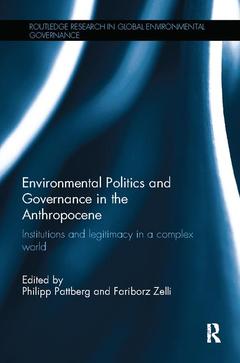Description
Environmental Politics and Governance in the Anthropocene
Institutions and legitimacy in a complex world
Routledge Research in Global Environmental Governance Series
Coordinators: Pattberg Philipp, Zelli Fariborz
Language: English
Subjects for Environmental Politics and Governance in the Anthropocene:
Keywords
Environmental policy; Environmental studies; Sustainability; Sustainable development; Polar Code; Anthropocene; Biofuels Governance; ecosystems; Ship Owners; co-evolution; Good Life; planetary crisis; Rhine River Basin; Earth System Governance; Global Climate Governance; Global Environmental Governance; Global South Perspective; Earth System Science; Joint Production Approach; C40 Cities Climate Leadership Group; Polycentricity Concept; Van Asselt; Public Private Partnerships; Paris MoU; Arctic Council; Soft Instruments; Port State Control; Polycentric Governance; Anthropocene Narrative; Rhine Action Programme; Marine Oil Pollution Preparedness; De La Fayette; IMO Standard
Publication date: 06-2017
· 15.6x23.4 cm · Paperback
Publication date: 01-2016
· 15.6x23.4 cm · Hardback
Description
/li>Contents
/li>Readership
/li>Biography
/li>
The term Anthropocene denotes a new geological epoch characterized by the unprecedented impact of human activities on the Earth?s ecosystems. While the natural sciences have advanced their understanding of the drivers and processes of global change considerably over the last two decades, the social sciences lag behind in addressing the fundamental challenge of governance and politics in the Anthropocene.
This book attempts to close this crucial research gap, in particular with regards to the following three overarching research themes: (i) the meaning, sense-making and contestations emerging around the concept of the Anthropocene related to the social sciences; (ii) the role and relevance of institutions, both formal and informal as well as international and transnational, for governing in the Anthropocene; and (iii) the role and relevance of accountability and other democratic principles for governing in the Anthropocene. Drawing together a range of key thinkers in the field, this volume provides one of the first authoritative assessments of global environmental politics and governance in the Anthropocene, reflecting on how the planetary scale crisis changes the ways in which humans respond to the challenge.
This volume will be of great interest to students and scholars of global environmental politics and governance, and sustainable development.
1. Global environmental governance in the Anthropocene: An introduction Part I Making Sense of the Anthropocene 2. The Anthropocene and the body ecologic 3. The sense of an ending? Nature and the Anthropocene4. Anthropocene: Delusion, celebration and concern 5. A fair distribution within the Anthropocene: A normative conception of sustainable development PART II Institutions in the Anthropocene 6. Mapping institutional complexity in the Anthropocene: A network approach 7. Transnational governance towards sustainable biofuels: Exploring a polycentric view 8. Governing the Artic in the era of the Anthropocene: Does corporate authority matter in Arctic shipping governance?9. International river governance: Extreme events as a trigger for discursive change in the Rhine river basinPART III Accountability and Legitimacy in the Anthropocene 10. Democratic accountability in the Anthropocene: Toward a non-legislative model 11. Monitoring commitments made under the Kyoto Protocol: An effective tool for accountability in the Anthropocene? 12. The legitimacy and transformation of global climate governance in the Anthropocene: Implications for the global South 13. The practices of lobbying for rights in the Anthropocene era: Local communities, indigenous peoples and international climate negotiations 14. Conclusions: Complexity, responsibility and urgency in the Anthropocene
Philipp Pattberg is Professor of Transnational Environmental Governance at the Institute for Environmental Studies (IVM), Vrije Universiteit Amsterdam, The Netherlands.
Fariborz Zelli is an Associate Professor at the Department of Political Science at Lund University, Sweden.




